Alexander J. Motyl's Blog, page 16
January 10, 2014
A Free Donetsk?
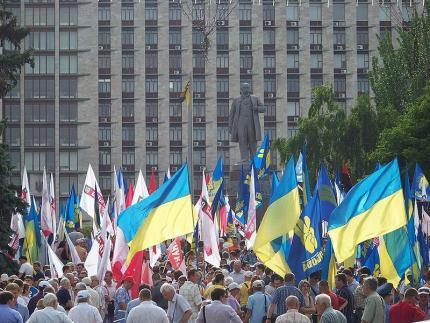
Want more proof of the fact that the Yanukovych regime is crumbling? Take a look at recent goings-on in his bastion, Donetsk.
Communists ruled the city with an iron fist for decades; then the equally thuggish and equally corrupt Regionnaires took over. The Yanukovych Family, their cronies, and Ukraine’s richest man—indeed one of the world’s richest men—Rinat Akhmetov control everything, making sure that the majority of the population reads, hears, and sees only what they want them to read, hear, and see and snuffing out opposition by means of intimidation, coercion, and violence.
Think of poor Donetsk as a mafia town that is also a company town. Small wonder that, while privately expressed criticism is rampant—especially by the city’s sizable educated elite—open opposition is minimal. To protest publicly could mean sacrificing your career, your family’s life chances, and, possibly, your health. With the population cowed, why shouldn’t the Regionnaires feel confident? Until now.
There have been rumblings of discontent in the past, but nothing—and I mean absolutely nothing—like what’s been going on since the Euro Revolution was launched in Kyiv. The people have spoken, and Donetsk will never again be the Regionnaire stronghold it used to be.
At first, it was only a small group of about 20 to 30 demonstrators who repeatedly assembled at the Shevchenko monument in central Donetsk. Then, a few weeks ago, several hundred brave protesters—young and old, male and female, Russian speakers and Ukrainian speakers—carried pro-democracy, pro-Europe, and anti-Yanukovych banners in a march through downtown. Some intemperate babushkas denounced them in the manner of white supremacists reacting to 1950s civil rights marchers in the American South. Most people just watched. About 20 percent applauded, smiled, or flashed victory signs.
As if so much downright chutzpah weren’t enough, the demonstrators went on to produce a New Year’s video greeting to Yanukovych, in which they calmly, coolly, civilly, and bilingually restated their democratic, pro-European aspirations, thanked Yanukovych for “uniting the country around one idea,” and encouraged him to make a “heroic decision and resign,” a move that “all Ukraine and all its citizens” would greet “with applause.”
For 500 marchers to assemble in Donetsk is the equivalent of 50,000 in Lviv or 500,000 in Kyiv. This is an earthshattering development, almost as important as the Euro Revolution itself. Think about it: Regionnaire hegemony in Donetsk has been broken. The place will never be the same again.
Watching the marchers, I couldn’t help but think of the three 1965 marches led by Dr. Martin Luther King Jr. in Alabama, from Selma to Montgomery. The civil rights activists, both black and white, marched into the belly of the beast—and emerged triumphant.
Like the American racists who could respond to the marchers only with violence and intimidation, so too the Regionnaires and their hired thugs have been responding to the democratic activists throughout Ukraine with violence and intimidation. But violence and intimidation are the weapons of the terrified, of the desperate, of the weak. Strong, self-confident, and popular rulers know they have nothing to fear from dialogue, concessions, and negotiations.
As a matter of fact, the Donetsk power-holders appear to be panicking. And nothing demonstrates that better than Akhmetov’s bizarre exchange on December 31st with picketers and journalists outside his estate. They had been reporting that he was absent, presumably in his luxury apartment in London. And then something remarkable happened. Ukraine’s richest man actually drove up to them in his own car—without his guards and wearing a running tracksuit (which suggests that he made the move spontaneously)—and started haranguing them about “promoting lies.” Which lies? That he was in London. (Uh, Rinat, that’s usually called a mistake, not a lie.) “Come to me with the truth, and I’m with you.” And on and on he went, in what can only be termed an intemperate rant, without permitting any comments from the people with whom he claimed to want a conversation.
The most striking thing about the performance was that Akhmetov had so visibly lost his cool. He was agitated and rambled on in an embarrassingly defensive manner. And if it’s true, as I suggested above, that he interrupted whatever he was doing to confront the picketers and journalists, then he must have been agitated indeed. After all, it’s not normally the case that a multibillionaire feels impelled to defend himself before a handful of the hoi polloi. Clearly, Akhmetov feels threatened by the Euro Revolution. Just as clearly, he knows that handful represents the coming Euro Revolution in Donetsk. Akhmetov, the ultimate survivor, knows the wind is blowing in a different direction.
He’s right. Donetsk is changing. Donetsk is becoming free. And a free Donetsk, maybe even more than a free Ukraine, spells the end for the Yanukovych mafia regime.
OG Image: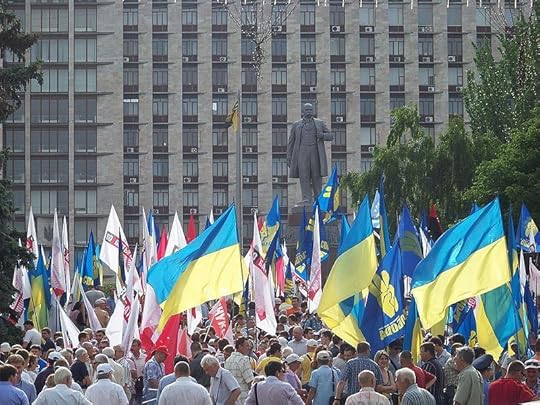
January 1, 2014
Taking Yanukovych to the International Criminal Court?
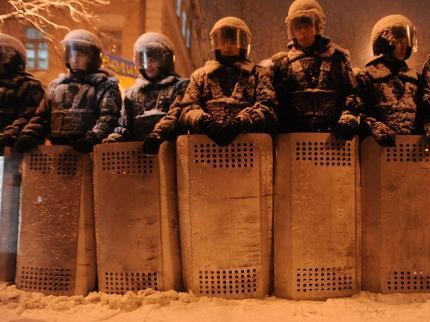
The savage beating on December 25th of investigative journalist Tatiana Chornovol has led Ukrainians to speculate about three possible explanations. The first is that the Yanukovych regime is directly responsible. The second is that rogue elements within the Ministry of Internal Affairs are responsible. The third is that it’s the Russians.
The third is least persuasive. Accordingly, the Putin regime is trying to destabilize Ukraine and weaken Yanukovych, in the hope, presumably, that both will be more pliant and open to the Kremlin’s machinations. But Ukraine is already unstable, Yanukovych is already in Putin’s pocket, and the Kremlin already calls the shots thanks to the neo-colonial deal it signed with Kyiv. I suppose it’s possible for Putin to be simultaneously stabilizing and destabilizing Yanukovych and Ukraine, but forgive me for suspecting this version is too clever by half.
The second is also unpersuasive, as it ignores the fact that Chornovol’s beating is just the latest in a long string of attacks on opposition activists. If rogues are trying to undermine Yanukovych, then they’re an odd lot, as their actions correspond exactly to the regime’s brutal treatment of the opposition since 2010. It’s the Yanukovych regime, after all, that’s been beating and jailing its opponents for the last three years. There were 101 instances of physical violence against Ukrainian journalists in 2013, up from 65 in 2012. And, if you recall, I had commented on the savage beatings of several FEMEN members last summer. If the regime’s previous violations of human and civil rights weren’t the handiwork of rogues, why should the Chornovol incident be?
Moreover, consider the following, probably incomplete, list of assaults on opposition activists since the Euro Revolution began.
November 22nd: Crimea, Serhii Mokrenyuk is attacked.
November 23rd: Zhytomyr, Vlad Puchych is beaten.
November 25th: Dnipropetrovsk, demonstrators attacked.
November 27th: Crimea, Mokrenyuk’s car is vandalized.
November 27th: Kyiv, Oleksandr Danylyuk’s car is set on fire.
November 28th: Zhytomyr, Vlad Puchych is beaten again.
November 29th: Ivano-Frankivsk, Maksym Kytsyuk is beaten.
November 30th: Ternopil, Volodymyr Khanas is beaten.
December 6th: Luhansk, Ihor Chudovsky’s car is set on fire.
December 13th: Kharkiv, demonstrators’ microbus is set on fire.
December 15th: Zhytomyr, Viktor Brokar is attacked.
December 16th: Uzhhorod, Yaroslav Shafar’s car is set on fire.
December 20th: Kharkiv, demonstrators’ headquarters are attacked.
December 20th: Crimea, Serhii Kovalsky’s car is shot at.
December 21st: Odessa province, Yevhen Burkut’s care is set on fire.
December 21st: Kharkiv, Ivan Varchenko is attacked.
December 21st: Volodymyr Moralov is attacked; his car is set on fire.
December 22st: Zhytomyr, Dmytro Tkachuk is attacked.
December 23rd: Kharkiv, local activist’s car is set on fire.
December 24th: Kharkiv, Dmytro Pylypets is knifed.
December 25th: Kyiv, Tetiana Chornovol is beaten.
December 27th: Dnipropetrovsk, local activist’s car is vandalized.
December 27th: Kharkiv, local activist’s car is set on fire.
December 28th: Kharkiv, Ivan Varchenko’s car is set on fire.
I suppose it’s remotely possible that Yanukovych knows nothing about this violence, but it’s having begun just as soon as the Euro Revolution took off can’t be an accident. As the US. Embassy in Kyiv correctly observed, “We express our concern at a strikingly similar series of events over the last few weeks, targeting individuals, property, and political activity, apparently aimed at intimidating or punishing those linked to the EuroMaidan protests.”
The first version—that Yanukovych’s forces are directly responsible for the Chornovol beating—is the most persuasive, both because it fits the facts and because it’s the simplest (and the social sciences always prefer the simplest explanations). The regime is thuggish and has been using violence and force since its inception. Yanukovych is thuggish and has been using violence and force throughout his entire career. Facing a mortal threat to their existence—the Euro Revolution—he and his regime are responding in the only way they know how. And, having no legitimacy and popular appeal, they are responding in the only way they can. If you can’t charm the people, or fool them, or buy them off, you have no choice but to beat them into submission. Not surprisingly, most of the assaults have taken place in the south and east, where the democratic opposition is making inroads and the Regionnaires are panicking.
It may be that Yanukovych gave the order for all these acts of violence or it may be that he simply instructed his underlings to get the job done. Whatever the case, as the man who runs the show, he carries all the responsibility for any such violence his people carry out.
That violence may very well continue through 2014. The Euro Revolutionaries are not about to go away, and the regime knows that its back is to the wall. The 2015 presidential elections are approaching and, although Yanukovych has no chance of winning a fair and free ballot, now more than ever he must win. But everyone knows that the only way he can do so is by means of more violence and more intimidation and more beatings.
Imagine that this sad scenario comes true. Imagine that the violence becomes widespread and systematic. Yanukovych may then be open to prosecution for “crimes against humanity.” According to Article 7 of the Rome Statute of the International Criminal Court of July 17, 1998:
For the purpose of this Statute, “crime against humanity” means any of the following acts when committed as part of a widespread or systematic attack directed against any civilian population, with knowledge of the attack: (a) Murder; (b) Extermination; (c) Enslavement; (d) Deportation or forcible transfer of population; (e) Imprisonment or other severe deprivation of physical liberty in violation of fundamental rules of international law; (f) Torture; (g) Rape, sexual slavery, enforced prostitution, forced pregnancy, enforced sterilization, or any other form of sexual violence of comparable gravity; (h) Persecution against any identifiable group or collectivity on political, racial, national, ethnic, cultural, religious, gender as defined in paragraph 3, or other grounds that are universally recognized as impermissible under international law, in connection with any act referred to in this paragraph or any crime within the jurisdiction of the Court; (i) Enforced disappearance of persons; (j) The crime of apartheid; (k) Other inhumane acts of a similar character intentionally causing great suffering, or serious injury to body or to mental or physical health.
The Yanukovych regime may already be guilty of “imprisonment or other severe deprivation of physical liberty in violation of fundamental rules of international law” and “persecution against any identifiable group or collectivity on political, racial, national, ethnic, cultural, religious, gender … or other grounds.” It’s not too hard to imagine an increasingly desperate regime’s resorting to “murder” and the “enforced disappearance of persons” in 2014.
Given the complexity of the International Criminal Court’s procedures, I’m not sure I’d bet on Yanukovych visiting The Hague in handcuffs. That said, miracles do happen, and concerned lawyers could increase the likelihood of their happening by preparing a case against Yanukovych ASAP.
In the meantime, as Ukrainians hope for Yanukovych’s appearance before the ICC and demand that the United States and Europe impose sanctions on the regime’s most thuggish thugs, the West may want to consider a policy measure it could easily and effortlessly adopt today. I wrote about it in a blog post of December 2, 2011.
Many Europeans probably don’t know that Ukraine has a 1998 statute on the books that permits just about anybody to acquire a diplomatic passport granting its bearer visa-free travel. As you’d expect, the president, prime minister, minister of foreign affairs, and genuine diplomats get to have a diplomatic passport. But so, too, do all parliamentary deputies, all cabinet ministers, all heads of provincial councils, the head of the secret police, a ton of other officials, and, just in case someone’s job description is not on the list, anybody with the “written approval of the Ministry of Foreign Affairs of Ukraine, on condition that the President of Ukraine approves it.”
The EU could end the Regionnaires’ monopoly on the real Europe in a flash. It wouldn’t have to blacklist Regionnaires, as some opposition democrats suggest. All it needs to do is quietly change a few rules and insist that the only Ukrainians who get to travel to the EU with diplomatic passports are bona fide diplomats engaged in bona fide diplomatic activity. Basta.
Everyone else—all the parliamentary deputies, all the provincial council heads, all the cabinet ministers, and all the president’s cronies—has to get on line at the appropriate European consulate, wait in stuffy rooms, fill out endless forms, pay exorbitant fees, produce invitations and bank accounts, and experience the same exact humiliation and frustration that regular folk do when they hope to go abroad.
Photo Credit: Mstyslav Chernov
OG Image: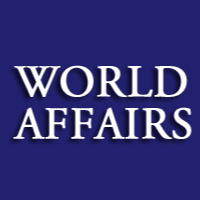
December 25, 2013
Rethinking the Euro Revolution and the Yanukovych Regime
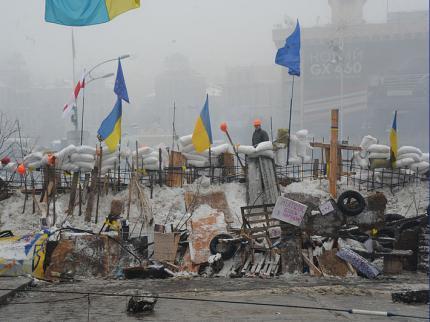
The Euro Revolution and the Yanukovych regime’s shameful deal with Putin’s Russia are as momentous conceptually as they are politically, requiring a new way of thinking about what has transpired in Ukraine and how Ukraine may be best understood. Now more than ever, as the regime attempts to redefine reality according to its twisted Orwellian categories, calling things by their rights names is imperative. Here’s a brief primer. The key terms are: declaration of independence, social contract, freedom, legitimacy, tyranny, occupation, colony, resistance movement,and national-liberation struggle.
First, in taking part in mass anti-regime demonstrations for more than five weeks, Ukrainians declared that the Yanukovych regime was ruling without their consent and was therefore illegitimate. In effect, Ukrainians made a declaration of independence from the regime, using the same logic (and oftentimes the same language) employed by American revolutionaries in 1776. Because Yanukovych systematically abused the Ukrainian people, neglected their interests, and violated the social contract between democratically elected rulers and the people who elected them, he ceased to be their “sovereign.” Once the sovereign turns against the people and acts tyrannically, he transforms himself into a usurper and the people are no longer obligated to obey him. Indeed, like the American revolutionaries, they have both the right and the obligation to defend themselves from his predations.
Second, in standing up for their rights, Ukrainians demonstrated to themselves, to the regime, and to the world that they are free and will fight for that freedom. The demonstrations began as protests against the government’s decision to snub the European Union; but they quickly morphed into assertions of the dignity and autonomy of the self. Now that Ukrainians have freed themselves from the fear, impotence, and self-denigration that many decades of Communist and post-Communist despotism promoted, there is no going back. Free Ukrainians—and they are now a majority of the country—have also sent a clear signal to the regime: that the Euro Revolution is only the first stage in what is likely to be a protracted struggle to replace an illegitimate regime with popular sovereignty.
Third, in violating the people’s trust, Yanukovych lost all the democratic legitimacy he had acquired in the 2010 presidential election. Some analysts continually invoke Yanukovych’s democratic election as if it were an unconditional mandate. It is anything but. A democratic election is not a mandate to abuse the people who elected you. A democratic election is an obligation to protect the people and promote their welfare. By violating that obligation, by systematically exploiting the people and enriching himself in the process, by undermining their very security and safety, by breaking the social contract, and ignoring the people’s legitimate demands that he step down, Yanukovych nullified the election and the legitimacy it bestowed on him and ceased to be president. He embraced tyranny—and thereby became a tyrant—and transformed his rapacious regime into an occupation force and his Party of Regions and their oligarch supporters into a collection of collaborators.
Fourth, in mortgaging Ukraine to Vladimir Putin in exchange for his temporary financial support, Yanukovych began the process of Ukraine’s transformation into a colony of Russia. Having torn up his social contract with the Ukrainian people, Yanukovych signed a new one with Putin. Yanukovych accepted the status of a lowly satrap in exchange for the ability to continue exploiting Ukraine economically and brutalizing Ukrainians politically. Yanukovych’s cultural policy is already determined in Moscow. Now his economic and foreign policy will also be determined in Moscow. Were he logically consistent with his own actions, he would shut down Ukraine’s embassies and consulates, return the buildings to the Ukrainian diaspora that bought them, and disband the Ministry of Foreign Affairs or rename it the Ministry of Liaison with the Kremlin.
The Yanukovych regime’s transformation into an occupation force and Ukraine’s creeping transformation into a semi-colony mean that Ukrainians, who now know that they too are fully human beings fully capable of self-rule, are engaged in a pro-democracy movement that is also a resistance movement and a national-liberation struggle. The Euro Revolution, a.k.a. the Maidan people’s movement, established in Kyiv on December 22nd, is just such a broad-based movement with the potential to become some combination of Poland’s Solidarity, the American civil rights movement, the black struggle against apartheid in South Africa, and Gandhi’s nonviolent movement in India. Brutality, violence, and repression are ultimately powerless against such a potent mix of invigorating ideas, uplifting morals, just causes—and millions of people.
Ukrainians have demonstrated their confidence, humanity, autonomy, and maturity during the Euro Revolution. As expected, Yanukovych has displayed his desperation, incompetence, and weakness; unexpectedly, Putin has revealed a proneness for strategic miscalculations. Yanukovych is certain to be as unreliable a satrap as he has been rapacious as a sultan. Worse, Putin apparently doesn’t understand that Russia lacks the economic resources and state strength to dominate a country as large and unstable as Ukraine. The costs of imperialism will prove too great for Putin’s economically stagnant and crumbling petro-state to bear—especially as a popular movement that supports democracy, human dignity, resistance to occupation, and national liberation is too powerful a contender for an illegitimate satrap to contain. Ukraine’s neo-colonial status will be short-lived and the collapse of Putin’s neo-imperial project may mean the collapse of Putin. And without Putin, Yanukovych will have nowhere to turn and nothing to do but run for the hills. This time, Interpol is likely to be on his heels.
OG Image:
December 20, 2013
Watching Yanukovych's Mafia Regime Squirm
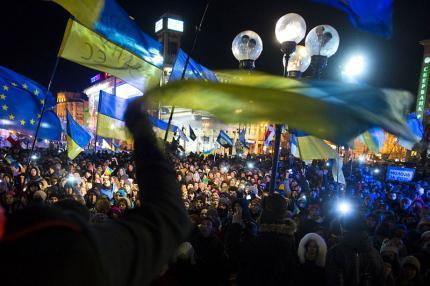
It’s been fun watching the Yanukovych regime squirm these last few weeks. Ukraine has exploded with the Euro Revolution. The world is in awe of the tenacity, spirit, nonviolence, and democratic ideals of the demonstrators. The United States has openly threatened the regime with sanctions. The European Union has expressed its displeasure. The people hate President Yanukovych and openly treat him as a buffoon.
And if that weren’t bad enough, the regime even failed to mobilize a mass demonstration in its own support on the weekend of December 14th and 15th. People were paid 300 hryvnia (about $37) and/or threatened with dismissal from their jobs. The regime had all the buses and trains it needed at its disposal. And instead of the 200,000 who were supposed to descend on Kyiv, something like 10,000 to 20,000 showed up. They stood around for a few hours and then rushed for the exits. Contrast that laughably small turnout with the hundreds of thousands who’ve voluntarily marched against the regime four weekends in a row.
If you’ve ever wondered what an emperor with no clothes looks like, take a look at Yanukovych.
The emperor hasn’t just been exposed as a weak and desperate tyrant; worse: he’s cornered. No one likes him; no one trusts him—neither inside nor outside Ukraine. So what’s a cornered emperor to do? There are two ways of reacting to such a predicament. The smart way is to evaluate how you got there, correct your mistakes, and seek a way out. The stupid way is to revert to all the instincts that got you cornered in the first place.
Guess which path the Yanukovych regime has chosen?
Might the regime consider offering the opposition a compromise, if only as a devious means of splitting it? Of course not. The Yanukovych camarilla refuses to make any concessions whatsoever. The government must stay. Prime Minister Azarov must stay. And all talk of political alternatives is treason. Basta.
How about engaging the opposition in an honest dialogue? Are you kidding? Azarov called the peaceful demonstrators Nazis, while Yanukovych convened a round table, ostensibly with the opposition, but made sure to pack it with his acolytes. And the authorities have begun investigating individual democratic activists, including the winner of the 2004 Eurovision Song Contest, Ruslana Lyzhychko.
Might the regime tone down its mendacity? Well, you know the answer. The Regionnaire deputy party boss in Parliament has called US Senators John McCain and Chris Murphy, who visited Kyiv on December 14th and 15th, “extremists.” Five local elections were also held that weekend and—surprise!—the regime unabashedly employed its usual shenanigans.
Might Yanukovych, who runs everything, at least take some responsibility for the brutality of his own riot police? No way. Yanukovych actually had the chutzpah to suggest that police and demonstrators were equally responsible for the violence. (And you can appreciate his logic: after all, if the protesters’ heads weren’t in the way, police clubs would have swung harmlessly through the air.) Then he tried to foist all the blame on three subordinates. When one of them accused national security adviser Andrei Klyuyev, an oily man who’s never refrained from employing the perks of office to pursue the just cause of self-enrichment, of having given the orders, the procurator’s office stepped in and absolved Klyuyev of wrongdoing.
Many years ago, when I was still in grad school, one of my professors said, “All these elaborate political science models of Soviet politics miss the point. The best model is the mafia.” He was right about the Soviet Communist Party then and he would have been equally right about the Yanukovych regime now. As Rajan Menon of New York’s City College says about Yanukovych, he is “id-driven.” Like any capo, he understands only force, greed, and fear.
How would a mafia boss respond to popular protests? Exactly in the manner of Yanukovych. He’d snarl and bang the table and fly into a rage and lie, lie, lie. Oh, and continue stealing—just to be on the safe side. Anders Aslund of the Peterson Institute for International Economics estimates that “embezzlement and corruption alone have probably generated $8 billion to $10 billion a year to the ‘Yanukovych family’ during the last three years.”
And if snarling didn’t work, the don would go to the capo di tutti capi—Russia’s Vladimir Putin—with hat in hand. Don Vlad apparently promised Yanukovych $15 billion in credits and a 33 percent reduction in the price of gas. The billions should save Yanukovych from looming default; the price decrease will line the pockets of Regionnaires and their oligarch pals. Meanwhile, the deal will guarantee that the Ukrainian economy will continue to spiral downward and be at the mercy of the regime’s predations.
And don’t be so certain that Putin will hand over the dough just like that. Russia’s economy is projected to be stagnant for the next 5 to 10 years, and easy money isn’t that easy anymore. Besides, Putin’s own fortune is, according to the New School’s Nina Khrushcheva, $40 to 70 billion. The fella knows the value of a hard-earned buck and is unlikely to shower a lazybones like Yanukovych with limitless lucre. He’ll attach so many strings that Yanukovych will be reduced to a puppet and Ukraine will be reduced to an underdeveloped colony with an exploited population determined to drive the camarilla from power.
Buoyed by his capitulation to Putin, Yanukovych has staved off humiliation for a while. His back is still to the wall, and he still has no idea of how to extricate himself from the mess he created. So expect him to continue promising the world, accelerating his “family’s” plundering of the economy, and trying to wear down the opposition by means of attrition and targeted repressions. Since the vast majority of the population detests him, do not expect the opposition to buckle under. Meanwhile, the risk for Yanukovych is obvious. The longer he stands in that corner with no clothes, the more likely will his increasingly desperate henchmen start squirming and looking for alternatives. Once pro-regime rats start jumping ship, you can say “hasta la vista, baby” to the emperor.
In the weeks ahead, Ukrainians, their friends in the world, and especially Don Vlad would do well to remember two things. (1) Never believe anything Yanukovych says or signs. (2) Always expect him to stab you in the back.
As the saying goes, you can’t teach an old thug new tricks.
OG Image: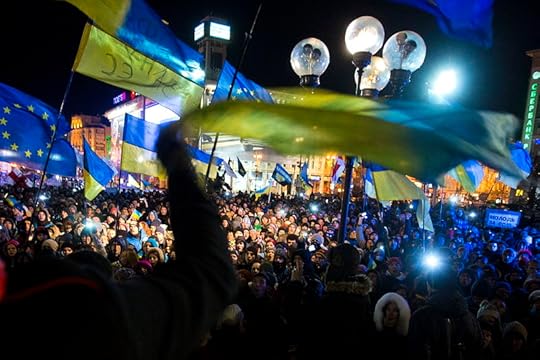
December 13, 2013
Remembering the Ukrainian Famine-Genocide
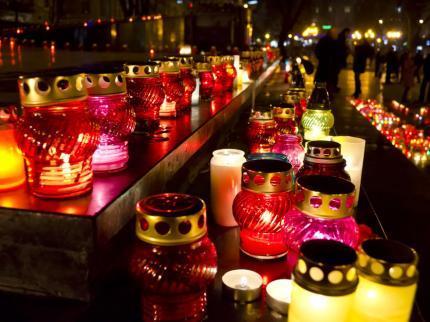
Although the ongoing Euro Revolution in Ukraine is rightly the focus of much of the world’s attention, we would do well to remember that on November 23rd Ukraine commemorated the 80th anniversary of the famine-genocide that took the lives of 3 to 4 million Ukrainian peasants in 1932–1933. As the United States contemplates whether or not it should threaten the Yanukovych regime with sanctions, we may want to remember that three Americans played key roles in reporting, denying, and remembering the events now known as the Holodomor.
Joseph Stalin’s decision in 1928 to seize privately held agricultural land and transform it into collective farms caused massive hardship for all Soviet peasants. When authorities expropriated peasant grain stocks and farm animals, hunger broke out in much of the USSR. In Ukraine, where close to a million peasants actively rebelled against collectivization, such expropriations were especially severe, leading to widespread starvation that the state both refused to alleviate and purposely aggravated until millions had died and a massive crackdown on Ukrainian political, cultural, and religious elites had been completed. At the height of the Holodomor, 25,000 Ukrainians starved per day; cannibalism was rampant.
Harry Lang, a writer and labor editor of the New York–based, Yiddish-language Jewish Daily Forward, reported the following for the New York Evening Journal:
A high official of the Ukrainian Soviet, with whom we established contact, confidentially advised me to take a trip to the villages. Only there, he said, would I see the full handiwork of the famine. And he added: “Six million people have perished from hunger in our country in 1932–33.” In the office of a Soviet functionary I saw a poster on the wall which struck my attention. It showed the picture of a mother in distress, with a swollen child at her feet, and over the picture was the inscription: “EATING OF DEAD CHILDREN IS BARBARISM.” I wondered. What was the purpose of such a poster? The Soviet official explained to me: “It is one of our methods of educating the people. We distributed such posters in hundreds of villages, especially in the Ukraine. We had to.” “Is the situation that bad?” I asked in astonishment. “Are people really in such a condition as to eat their children’s corpses?” The official was silent. It was a painful, disturbing silence. “Not all our people are enlightened,” he remarked a little later. Again I shuddered. But I went down to the Ukraine and saw with my own eyes the destruction wrought there, the wreckage of a great country.
Unfortunately, Lang’s honest reporting did not influence American public opinion as much as the mendacious stories written by Walter Duranty, Moscow bureau chief of the New York Times and winner of the Pulitzer Prize in 1932.
Here’s what Duranty wrote in March 1933, at the height of the famine: “There is no actual starvation or deaths from starvation but there is widespread mortality from diseases due to malnutrition, especially in the Ukraine, North Caucasus, and Lower Volga.” Later that year, Duranty wrote that any talk of famine is “a sheer absurdity.”
Duranty knew he was lying. Privately, he told the British Embassy: “The Ukraine has been bled white. The population was exhausted and if the peasants were ‘double-crossed’ by the Government again no one could say what would happen.” It was “quite possible that as many as 10 million people may have died directly or indirectly from lack of food in the Soviet Union during the past year.”
Raphael Lemkin, the Polish-Jewish scholar who coined the term “genocide” and played a large role in the adoption of the United Nations Convention on the Prevention and Punishment of the Crime of Genocide, set the record straight in 1953. Lemkin, who lost scores of relatives in the Holocaust, immigrated to the United States in 1941 and taught at my university, Rutgers-Newark.
Ukraine is highly susceptible to racial murder by select parts and so the Communist tactics there have not followed the pattern taken by the German attacks against the Jews. The nation is too populous to be exterminated completely with any efficiency. However, its leadership, religious, intellectual, political, its select and determining parts, are quite small and therefore easily eliminated, and so it is upon these groups particularly that the full force of the Soviet axe has fallen, with its familiar tools of mass murder, deportation and forced labor, exile and starvation.... Between 1932 and 1933, 5,000,000 Ukrainians starved to death.... This is not simply a case of mass murder. It is a case of genocide, of destruction, not of individuals only, but of a culture and a nation.
Unsurprisingly, Ukrainians refer to the famine of 1932–1933 as the “Holodomor”—or killing by famine. (An excellent documentary about the Holodomor is the Canadian film director Yurij Luhovy’s award-winning Genocide Revealed.)
Bizarrely, some historians insist that remembering the Holodomor somehow diminishes the Holocaust. That’s a bit like saying that remembering World War I diminishes World War II or that remembering slavery in Haiti diminishes slavery in America. Remembering or commemorating tragedies is not a zero-sum game; the human capacity for empathy is, after all, boundless. If I comprehend the horror of the Holodomor, I am better equipped to comprehend the horror of the Holocaust. And if I comprehend the horror of the Holocaust, I can better comprehend the horror of the Rwandan genocide. There are, alas, more than enough tragedies with which we can learn to empathize.
No less bizarrely, others suggest that Ukrainians concocted the word Holodomor so as to compete terminologically with the term Holocaust. That, too, is nonsense. The Ukrainian word for famine happens to be holod, which means the choice for a term is between Holod and Holodomor, the latter combining holod with part of the word moryty (“to kill”). By chance, both terms share their first four letters with Holocaust, yet neither of them have the same number of syllables.
Equally absurd are claims that Ukrainians have inflated estimates—to 6 or 10 million—so as to “beat” the Holocaust. As the above three citations illustrate, Lang reported 6 million dead, Duranty 10 million, and Lemkin 5 million. Where else were people to get numbers before more reliable demographic data became available recently and the 3 to 4 million figure became the most accurate current estimate (which isn’t to say that it won’t be revised upward or downward if and when still more detailed micro-data become available)?
Fortunately, despite Duranty’s efforts to deny the Holodomor, honest men such as Lang and Lemkin saved it from the oblivion into which Stalin and his henchmen hoped it would disappear. Just as fortunately, despite some scholars’ attempts to place the Holodomor in competition with the Holocaust, reasonable people can agree that such one-upmanship is obscene and that neither tragedy should ever be repeated.
Ukraine has a particular stake in remembering the Holodomor and the Holocaust, precisely because both genocides devastated its people. Since the Yanukovych regime is congenitally indifferent to human tragedy, the task of honoring the victims of both genocides will be up to a democratic post-Yanukovych government.
Now that the Lenin statue has been toppled in Kyiv, why not replace it with a simple statue honoring a great man who stood for everything the Bolshevik tyrant rejected—Raphael Lemkin?
OG Image:
December 10, 2013
Lenin's Final Fall in Kyiv
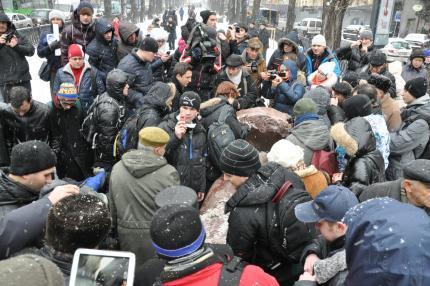
Whatever the outcome of the ongoing “Euro Revolution” in Ukraine, future historians will view the destruction of the Lenin statue in downtown Kyiv as a milestone in the country’s move away from its Soviet past and Regionnaire present.
Vladimir Illich Lenin was a brilliant polemicist and strategist who arguably made the Bolshevik Revolution. But he was also a tyrant who countenanced, encouraged, and committed what we would today call massive crimes against humanity. Regardless of whether or not Leninism directly led to Stalinism, Lenin and Leninism made Stalin and Stalinism possible and, indeed, likely. No country claiming to be civilized would honor mass murderers in one of the most visible and central parts of its capital city. Until the evening of December 9th, Ukraine did.
The young Ukrainians who tore down Lenin were acting in the spirit of anti-regime protesters the world over. Hungarians felled a huge Stalin statue during the Revolution of 1956. Russians toppled a monument to Feliks Dzerzhinsky, the bloodthirsty founder of the Bolshevik secret police, in 1991. And Iraqis destroyed a statue of Saddam Hussein in 2003. Like the Iconoclasts in the Byzantine Empire, rebels and revolutionaries understand that symbols can sustain oppressive regimes as much as violence.
Lenin’s felling may mark a caesura in Ukrainians’ self-understanding. Having been victimized by two world wars, a genocidal famine, and decades of totalitarianism and imperialism, many Ukrainians developed a range of survival mechanisms that rested on self-abasement and self-denial. The marble Lenin guarding the intersection of Shevchenko Boulevard and Kyiv’s Broadway, the Khreshchatyk, was a permanent reminder of their servile status. With Lenin smashed to pieces, all Ukrainians are now free to reinvent themselves as empowered human beings capable of deciding their own fates.
The contrast between how many Ukrainians already view themselves and how the regime still views them was best captured by the mayor of Viktor Yanukovych’s home town, who assured a small group of regime supporters that “Big Daddy [Yanukovych] will never betray his children.” As the “father of the revolution,” Lenin was of course the ultimate Big Daddy. His departure paves the way for the current Big Daddy’s departure.
The Ukrainians taking part in the Euro Revolution already consider themselves to be rational adults with no need of any Big Daddy’s solicitude. In marching, protesting, and demanding their rights as human beings, they are explicitly demonstrating that they have broken with the subaltern psychology that helped keep Communist and post-Communist tyrants in power.
It is especially fitting that Lenin’s fall should have taken place just two weeks after Ukrainians commemorated the 80th anniversary of the Holodomor, the famine-genocide that took the lives of millions in 1932–1933. If anything broke the people’s spirit and reduced Ukrainians to serfs, it was the Holodomor. A mass murder is bad enough. But no less debilitating for the survivors was that they were not only compelled to deny that the famine had ever taken place. For several generations they were also forced to glorify its perpetrators. It’s as if Jews had to deny the Holocaust and praise Hitler, Himmler, and Goebbels. Whatever the psychological consequences of living in such a twisted world, they cannot have been good.
Although it was Stalin, and not Lenin, who engineered the Holodomor, Lenin’s felling on December 9th opens the door to a full-scale national psychological convalescence. Most Ukrainians now recognize the Holodomor as genocide; in so doing they are finally coming to grips with the trauma it produced. Now that Lenin is gone from downtown Kyiv, Ukrainians are in the position to state that no Big Daddy, whether on the left or on the right, will ever again determine their fates.
OG Image:

December 6, 2013
Ukraine’s Multiple Crises
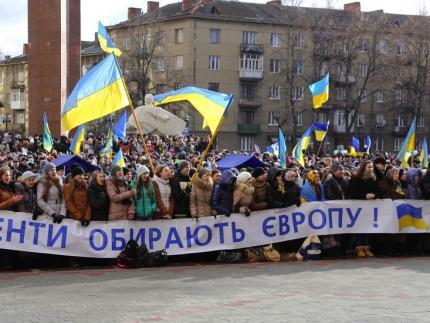
If current conditions in Ukraine look revolutionary to you, that’s because the Yanukovych regime has maneuvered the country and itself into a series of reinforcing crises. If the regime holds on to power, the crises will only deepen. If the opposition comes to power, with or without Regionnaire participation, it will face monumental tasks requiring almost superhuman wisdom and skill. In a word, whatever the denouement of the ongoing standoff between opposition and regime in Kyiv, Ukraine will be a mess for some time to come.
Crisis is a sexy word that means all things to all people, but, if used rigorously, it usually means a life-threatening condition, one in which, to pursue the medical analogy, the patient faces a 50-50 chance of recovery. It’s impossible to apply the word with equal precision to social reality, but the point is that we should use crisis only with reference to extremely serious conditions that appear to be unsustainable for more than the short term.
Seen in this light, the Yanukovych regime has created three crises: a crisis of the regime, a crisis of the economy, and a crisis of presidential legitimacy. Significantly, all three are the result of the system of centralized rule Yanukovych introduced, or what I have called sultanism.
As I have repeatedly argued in this blog, sultanism is intrinsically unstable:
Yanukovych quickly accumulated vast powers, thereby transforming the presidency into a near-dictatorial office, while subordinating the other two branches of government—the Parliament and the courts—to himself and his party…. Given the evisceration of the non-presidential branches of government and the emergence of the Regionnaires as the party of both power and theft, it was inevitable that Yanukovych would become the focus of increasingly personalized rule, while his closest confidantes would join him in plundering the country. The logical end point of this institutional development was reached in 2012: the triumph of Yanukovych and his “Family,” the reduction of the Rada and the courts to meaninglessness and buffoonery, and the transformation of the Party of Regions into nothing more than an instrument of rapine. Because sultanistic regimes are invariably corrupt and conservative, there is no reason to think that the avaricious mediocrities who man the Yanukovych system will be able or willing to sacrifice their well-being to vague notions of reform, especially if reform undermines their power and privilege…. [S]uch a deeply dysfunctional regime is a leading candidate for stagnation and decay.
Sultanism is also responsible for the economic crisis, which is best described by Anders Aslund:
Rather than following its commitments to the IMF, the Ukrainian government has imposed strict currency regulations to make it exceedingly difficult to take money out of the country. It has also pursued very high interest rates…. The high interest rates have kept inflation at zero, but they have also killed investment and thus liquidated economic growth. Output has fallen for the last five quarters. The expected contraction for 2013 is now 1 percent, but it might become 1.5 percent.
It is difficult to imagine a worse economic policy…. Why would any government pursue such a harmful and mindless economic policy? The simple answer is that it benefits the ruling “family” and its closest friends. Previously unknown individuals, who are presumed to be connected with people at the top, have taken over a large number of private companies at low prices. The worse the economic situation is, the cheaper Ukrainian companies become for these selected buyers….
Yanukovych is walking on eggshells. Ukraine’s economic situation is precarious. The risk for a run by ordinary Ukrainians both on banks and the Ukrainian currency is evident, though Ukraine has been on the brink for so long that no panic is apparent. The rating agencies mercilessly downgrade Ukraine ever lower, and corporate defaults are all too common. Ukraine is in desperate need of an IMF agreement, but Yanukovych has recently firmly rejected any (necessary) increase in domestic gas prices, and it should depreciate the hryvnia in any case.
Finally, sultanism is responsible for the evisceration of Yanukovych’s legitimacy. Having arrogated to himself all the state’s powers, Yanukovych, unsurprisingly, proved incapable of meeting popular expectations. No one can be a sultan in today’s complex world. And least of all is a provincial politician with no understanding of politics and economics able to play that role.
In sum, the Yanukovych regime, the Ukrainian economy, and Yanukovych himself are in crisis. The only things in Ukraine that are not in crisis are civil society and the political opposition, which have been getting progressively stronger in the three years since their partial demobilization in the aftermath of Viktor Yushchenko’s disastrous administration.
Small wonder that this “Euro Revolution” has broken out. On the one hand, there’s a crisis-ridden president, regime, and economy. On the other hand, a vigorous civil society and opposition. Look at any historical revolution and you’ll find these same ingredients present.
Given the severity of this contradiction, do not discount the possibility of a regime collapse. There are ample precedents for just such an outcome. Also possible is a “managed transition,” involving regime and opposition, or a protracted standoff that intensifies the political and economic crises and makes Ukraine ungovernable and ripe for another mass uprising. Least likely is a Pinochet-like crackdown: crisis-ridden regimes lack the resources to pull off such feats.
Which outcome will produce a government most capable of dealing with Ukraine’s multiple crises?
Obviously, both a protracted standoff and a crackdown would only push Ukraine to the brink of systemic collapse.
Since Yanukovych and the Regionnaires caused the crises, their absence is probably the necessary condition of any sustained attempt at resolution. The sufficient condition is, of course, the ability of the democratic opposition to eschew cheap populism and promote wise policies. In principle, that’s possible. Riding on a wave of popular support, they could have the legitimacy to introduce painful measures that the people would be willing to accept. After the disaster of Orange rule, the opposition may have also learned a thing or two about effective policymaking. The problem with this scenario is that, rightly or wrongly, most Ukrainians have little regard for their opposition leaders—which might incline them to engage in the very populism they need desperately to avoid.
Since Yanukovych and the Regionnaires will be unwilling to leave the scene voluntarily, a managed transition and the formation of a coalition government will be more palatable to them. On the other hand, Regionnaire involvement in policymaking could easily doom new plans to ineffectiveness. After all, how likely are they to agree to the dismantling of the sultanistic system that feeds them (even though it created the crises)? That in turn means that such a government could work if and only if the Regionnaires were to be assigned a distinctly secondary role in policymaking. And that could happen only if the West, the opposition, and the people left them no choice.
There is, then, no easy way out of the Yanukovych-induced mess. But, for the first time in many years, there is hope in Ukraine. And for Ukrainians, who have had to live with the prospect of continued regime predations, that may be the most important thing.
OG Image: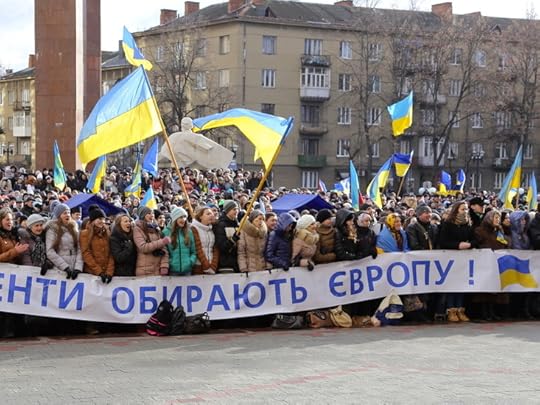
December 3, 2013
Dear President Yanukovych, Resign!
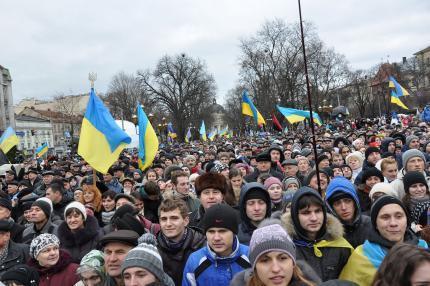
Viktor Yanukovych!
You were elected president of Ukraine in 2010. After several years of ineffective rule by your predecessor, you had a golden opportunity. You could have become president of all the people. You could have committed yourself to promoting the well-being and dignity of the people who elected you. You could have dedicated yourself to setting Ukraine on the path of political and economic reform and European and global integration. You could have promoted democracy, freedom, tolerance, and human rights. You could have served the people selflessly.
Instead, you chose to use your office for your own ends.
Instead of becoming president of all the people, you turned Eastern Ukraine against Western Ukraine and promoted linguistic divisions.
Instead of promoting the well-being and dignity of the people who elected you, you chose to impoverish them, deny their identity, and treat them as chattel.
Instead of dedicating yourself to setting Ukraine on the path of political and economic reform and European and global integration, you created a backward gangster state that fears Europe and the world and everything they stand for.
Instead of promoting democracy, freedom, tolerance, and human rights, you centralized power in your hands, transformed the Parliament into a rubber-stamp institution, jailed your critics, squeezed media and civil society freedoms, inflamed inter-ethnic, inter-confessional, and inter-cultural tensions, promoted extremism, chauvinism, and supremacism, and tried to transform Ukrainians from citizens to subjects dependent on your power and whim.
Instead of serving the people selflessly, you and your family amassed fabulous wealth and, as people’s living standards dropped precipitously, flaunted it shamelessly.
You betrayed the people’s trust. You violated their confidence. You dashed their hopes and expectations. You transformed yourself from a defender of the people to a predator on the people. You once had legitimacy. Now you have none.
In losing all legitimacy, you transformed yourself from a president who promotes the people’s interests with the authority vested in his office by the Constitution to a power-holder who serves his own interests with the knout.
Rule by the knout is ineffective, inefficient, and unstable. It never lasts—especially when the citizens you degrade refuse to be treated as chattel.
You should not be surprised that they have risen up against you, the system you built, and everything you represent.
All Ukrainians, regardless of their linguistic preferences, want dignity, freedom, democracy, and human rights. They desire to live normal lives in a normal country free from the predations of venal power-holders who know only how to swing the knout.
In marching in the streets of Kyiv, Lviv, and other cities, Ukrainians have demonstrated that, after three years of your predations, they have not lost their spirit, dignity, and desire for freedom. They have shown that you have lost and that your attempt to build a gangster state has failed.
Permit me to inform you that they have demoted you from president of Ukraine to the provisional occupant of the presidency of Ukraine.
You should act accordingly and resign.
The fact of the matter is that you have maneuvered yourself into a hopeless position. You have no allies in the world. You have minimal support in Ukraine. The economy is on the verge of collapse. The government is ineffective. Your regime is cracking. Your rule is evaporating.
You know better than anyone that violence is not an option. The army and militia are unreliable, the internal troops are untested, and the special forces are too few. Do you really want to risk provoking a civil war that could destroy the country and that you will not be able to win?
Reform is still an option, and it just could restore some of your legitimacy, but your personal stubbornness and unwillingness to countenance concessions close off that route.
Even if, by some miracle, you succeed in dispersing the demonstrators demanding your resignation, Ukraine will become ungovernable, you will be reviled, and your rule will be doomed.
The choice before you is simple: resign now with dignity and guarantees of security or resign later without dignity and without guarantees of security.
Ukrainians have made their choice: they want you to go.
Now make yours.
Photo Credit: DixonD
OG Image: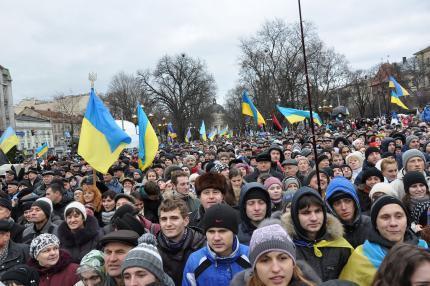
November 27, 2013
What the Mass Demonstrations in Ukraine Mean
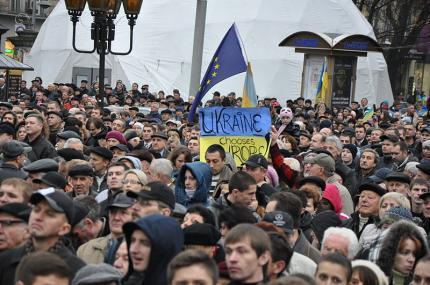
Whatever the outcome of the mass demonstrations that rocked capital city Kyiv on Sunday, November 24th, their meaning is clear. The spirit of the 2004 Orange Revolution is alive and well in Ukraine, and the Yanukovych regime had better watch out.
Some 100,000 to 150,000 Ukrainians assembled in downtown Kyiv to protest the regime’s rejection of an Association Agreement with the European Union. (Another 20,000 to 30,000 marched in Lviv on November 25th, and hundreds of Crimean Tatars set out for Kyiv on November 26th.) For them, and for countless others, the agreement represents much more than a trade pact and access to European goods. It was, first and foremost, a “civilizational choice”—an irreversible move by their country toward European democracy and away from Russian despotism. In snubbing the agreement, the regime effectively told Ukrainians that they would never be free and independent.
In mobilizing in Kyiv and other cities, however, the people effectively told Yanukovych and his Regionnaire cronies that they would not accept tyranny. As one journalist put it: “The Sunday events once again demonstrated something that is the object of envy of many residents of Moscow: people in Kyiv are freer…. They conduct themselves as the citizens of a republic, and not the subjects of an all-powerful tsar.”
For several years now, Ukrainian and foreign analysts have been insisting that Ukrainians had become apathetic, passive, and indifferent, and that mass protests would never again take place. There was massive evidence to the contrary: continual demonstrations throughout all of Ukraine, by Ukrainian- and Russian-speaking students, businesspeople, pensioners, veterans, feminists, environmentalists, urban preservationists, and many others. Contrary to the claims of many dispirited analysts, civil society was vibrant, if only one looked closely. Discontent was ubiquitous. Meanwhile, regime predations continued unabated: unjustified political arrests, rampant corruption and outright theft of state property, the falsification of history and the denial of memory, attempts to curb freedom of speech, assembly, and press. The emergence of the Yanukovych “Family,” a money-grubbing camarilla centered on the president and his two sons, illustrated just how closely his regime had come to resemble the “socialism in one family” once practiced by Romanian dictator Nicolae Ceausescu, his wife Elena, and their playboy son Nicu.
Seen in this light, the government’s rejection of the Association Agreement was the last straw: the spark that mobilized the people and revealed the depths of their hatred of the Yanukovych regime. Some scholars, and many revolutionaries, might call the ensuing condition a “revolutionary situation.” And they’d be right to do so. For the first time since Yanukovych’s unfortunate election as president in early 2010, his corrupt regime could actually be toppled (especially if demonstrations acquired renewed force after the EU’s Vilnius Summit takes place on November 28th and 29th and Yanukovych fails to backtrack and sign after all). Should Ukraine’s president eventually fall, he would have the richly deserved distinction of possibly being the world’s only leader to have been humiliated twice by people power.
Of course, it’s possible that the demonstrators will be dispersed or that Yanukovych will satisfy their demands by dismissing the Azarov government and actually signing the agreement at Vilnius. At the moment, the situation is too fluid for the ultimate denouement to be even remotely predictable. But one fact remains indisputable: mass protests on the scale of the Orange Revolution are taking place. The regime now knows that the Ukrainian people’s democratic aspirations have not withered and died. It knows that it’s lost the hearts and minds of the young (the students of Kyiv’s top two universities joined the demonstrators en masse on November 26th) and has no future. It knows that the people want to be free. And the regime knows that they detest it.
Worse for the regime, it has stupidly provided the opposition with the ideal slogan and the perfect brand. Ukraine’s democrats are now all Europhiles. Their goals boil down to one word—Europe. Their fears boil down to two—Putin’s Russia. Their allies are all people who support Ukraine’s European choice. Their opponents are all authoritarians who insist that Ukraine remained mired in its Soviet past and aspire to be a colony of a despotic, neo-imperial, and chauvinist petro-state.
If Yanukovych had welcomed the Association Agreement, he could have positioned himself as Europe’s champion. Now, he’s defined himself as Europe’s enemy. Had he freed Yulia Tymoshenko, as the EU requested, he could have claimed to be magnanimous. Now that she’s declared an open-ended hunger strike on November 25th, he can look, at best, vindictive or weak.
Whichever way you look at it, the regime is rapidly maneuvering itself into a dead-end.
The Ukrainian anthem begins with the words, “Ukraine still lives.” Despite the regime’s best efforts to transform the population into a mindless rabble, Ukraine’s pro-European demonstrators have shown that it’s alive and kicking. It’s just a matter of time before one of their kicks lands squarely on Yanukovych.
OG Image: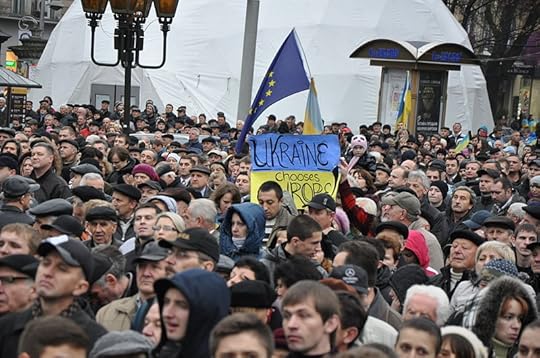
November 25, 2013
Yanukovych Chooses Russia over EU for Ukraine
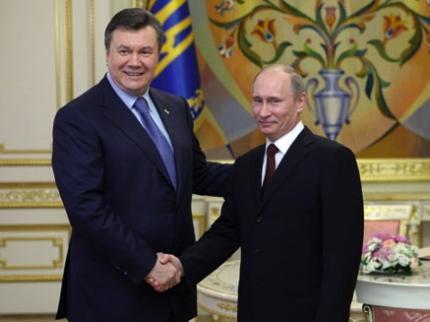
So how are we to interpret the decision by Ukrainian President Viktor Yanukovych, to turn his back on an Association Agreement with the European Union?
The underdevelopment of Ukraine’s economy will now be accelerated, as the country becomes even more isolated from that of the world; its population will become significantly poorer. The opposition will become more implacable, more radical, and more intransigent, and its popular support will grow. The polarization within Ukraine between Europhiles and Russophiles will intensify and major civil disturbances are now quite possible, especially in the run-up to the 2015 presidential elections, which Yanukovych cannot possibly win fairly, freely, or even quasi-fairly and freely.
As Ukraine descends into poverty, ungovernability, and instability, what could Yanukovych have possibly been thinking?
Remember that Yanukovych acts on the basis of two simple principles:
The absolute imperative of power. Schooled in the Leninist understandings of politics as a battle between dominants and subordinates (“Kto kogo,” or “Who whom,” as Lenin put it), Yanukovych believes that loss of power spells capitulation. But, having mismanaged Ukraine for three years, he must also fear that, if he loses power, his successor will imprison him, just as his regime did to the head of the previous government. Finally, a product of Donetsk economics, Yanukovych believes that wealth can be acquired only be means of power.
A deep mistrust of liberalism and a concomitant preference for authoritarianism. Both features flow from his Leninist-Donetsk-style understanding of power and are exacerbated by his inexperience in international relations and apparent distrust of more worldly political figures, especially when they’re women (witness his treatment of political opponent and former Prime Minister Yulia Tymoshenko).
Seen in this light, Yanukovych’s decision to abort the EU agreement makes perfect sense—for him, that is.
Integrating with Europe would mean that he would have to try to meet Western electoral standards and get reelected cleanly in 2015—which would never work—or make himself attractive enough to Europhile voters to get their votes—which would mean talking and acting like a liberal. Rejecting the Association Agreement makes Yanukovych unelectable on any legitimate basis, but leaves the door open to fraud and coercion, which appeals to his authoritarian impulse. Integrating with Europe would also mean living up to Western judicial standards and releasing Tymoshenko from prison. That was a deal-breaker both because rule of law is anathema to him and because it would have meant losing face by caving in to a woman.
And what of Ukraine’s seemingly inevitable decay? Given the principles that underlie Yanukovych’s behavior, the country’s immiseration, underdevelopment, and instability are actually good things for him. After all, the weaker and more isolated the country is from the Western world’s inconvenient standards, the easier it is to control politically and exploit economically. Now that Yanukovych has donned Leonid Brezhnev’s mantle and transformed Ukraine into a stagnant version of the late USSR, expect Ukraine’s downward slide, if undeterred, to be purposefully promoted by the regime.
The only silver lining in this cloud is that these same principles will also militate against Yanukovych’s joining Vladimir Putin’s neo-imperialist pet project, the Customs Union made up of such, er, thriving market economies as Russia, Kazakhstan, and Belarus. Joining the CU would bring Yanukovych and his corrupt operations within the Kremlin’s sphere of influence and undermine his power and wealth.
Fortunately, all is not lost. Like all tin-pot authoritarians, Yanukovych thought he could pull a fast one on the people. He was wrong. On Sunday, November 24th, hundreds of thousands of Ukrainians took to the streets in protest against the regime’s anti-European moves. The opposition called for the government’s resignation and Yanukovych’s impeachment. They may or may not succeed this time, but one thing is clear, and Yanukovych must know it. Sooner or later, his regime will come crashing down. The only question is: will the collapse be peaceful or not?
OG Image: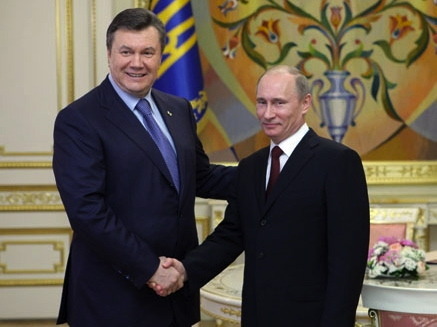
Alexander J. Motyl's Blog
- Alexander J. Motyl's profile
- 21 followers



